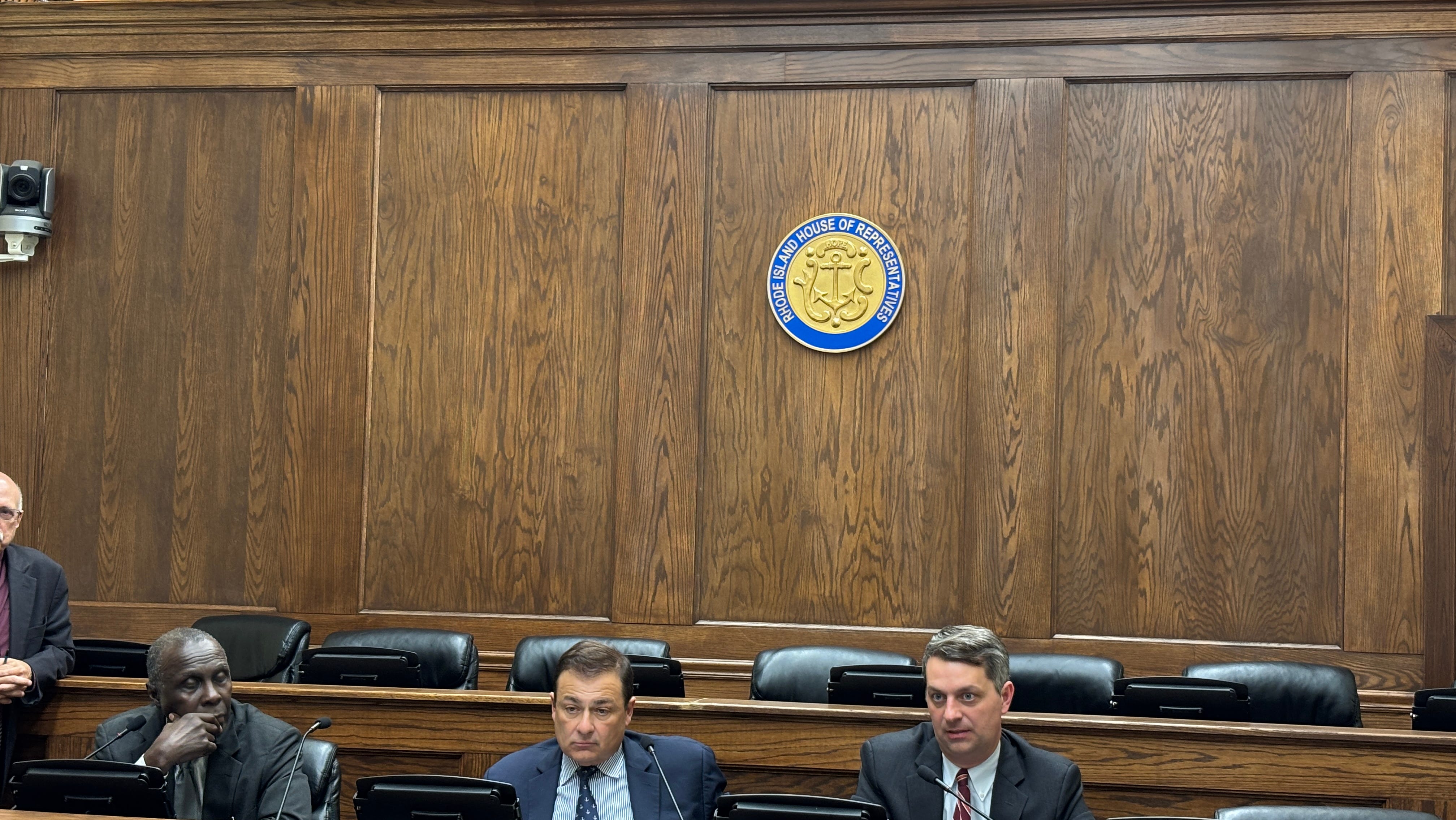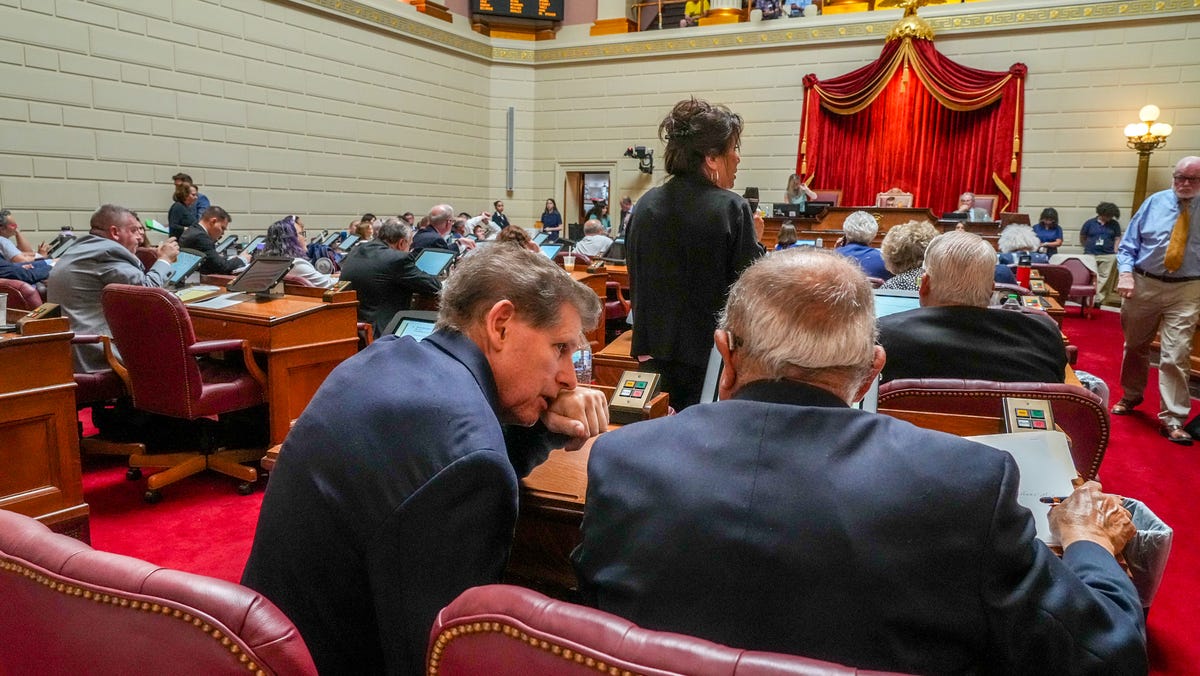
House Speaker Shekarchi describes priorities in new $14.3B RI budget
House Speaker K. Joseph Shekarchi describes the priorities in new $14.3B state budget
- The Rhode Island General Assembly wrapped up its 2025 session on Friday, June 20.
- An assault weapons ban, payday lending restrictions, and the state’s $14.3 billion budget all were approved.
Rhode Island lawmakers banned “payday lending,” snuffed out smoking in most parts of Rhode Island’s casinos and gave final blessing to a $14.3 billion state budget on their way to the end of the 2025 legislative session.
The General Assembly began its final day of lawmaking shortly after 2 p.m. on June 20 with a tense Senate debate and vote to approve its version of an assault weapons ban, which the House would later send to Gov. Dan McKee for his signature.
That launched a flurry of voting as the two chambers passed reams of legislation that ended at 1:33 a.m. June 21 in the House and the Senate at 1:36 a.m.
The bills headed to McKee’s desk include an anti-bid-rigging statute that he opposed, a law preventing employers from making their workers hear their political views, and yet another study of a bottle redemption program.
And they include House Speaker K. Joseph Shekarchi’s dozen bill housing package.
With Congress debating a federal spending bill with major cuts to Medicaid and the food assistance program known as SNAP, Rhode Island lawmakers may return to the State House in the fall for a rare special session to respond to any loss of federal cash.
The budget and RIPTA
There was little doubt the Senate would give final approval of the $14.3 billion state budget that House lawmakers had passed three days earlier, but that didn’t mean the final floor debate was without drama.
The Rhode Island Public Transit Authority faced a $33 million budget shortfall when McKee proposed his version of the budget in January with no extra money for the agency. The shortfall was cut nearly in half when the House added $15 million for the bus system in its budget rewrite.
But that left a roughly $18 million hole that the agency said it would be forced to fill with a mix of fare hikes, spending cuts and bus route reductions.
In a letter to lawmakers earlier in the week, RIPTA CEO Christopher Durand said a consultant had identified another potential $5 million, but the budget gap would likely result in the layoff of 90 employees and a 20% service reduction.
Providence Democratic Sen. Sam Zurier proposed a budget amendment on the Senate floor that would have sent another $10 million to RIPTA, taken from funds now going to the Department of Transportation.
“I believe that the Department of Transportation can absorb this loss of revenues without major changes to its operations,” Zurier said. “While this would not be ideal, I would submit that this loss is much easier for Rhode Islanders to manage than the current budget’s $10 million reduction for RIPTA, which could harm the lives of thousands of Rhode Islanders every single day.”
Defending the existing budget, Senate Finance Committee Chairman Louis DiPalma, D-Middletown, said that while it was not immediately clear what highway projects might be slowed down if the DOT lost $10 million, any potential delay required voting against the amendment.
“I recommend my colleagues to vote this red because we’ll be impacting other road and bridge projects in our state,” DiPalma said.
The amendment failed, 16-20.
Another budget amendment voted down on the Senate floor, this one from Providence Democratic Sen. Jonathon Acosta, would have required health care facilities to tell the state if they are in financial distress, something McKee wanted earlier in the year.
The budget for the year starting July 1 is around $120 million more than McKee had proposed in January and $370 million more than the current-year budget.
But those numbers likely underestimate actual state spending. The budget passed by lawmakers also rewrites the $14 billion budget for the current fiscal year, which ends in a little more than a week, up to $14.8 billion.
All four Republican senators voted against the budget, objecting to tax hikes such as an extra 2-cent-per-gallon hike in the gas tax and new “Taylor Swift tax” on second homes worth more than $1 million.
“The state of Rhode Island has a spending problem, so I will be voting no,” Sen. Gordon Rogers, R-Foster, said.
But the Democratic majority hailed the $45 million in additional Medicaid reimbursements for primary care, paid for in large part with a $4-per-month, per-person fee on health insurance. The budget also puts an extra $38 million into hospitals and $12 million into nursing homes.
“This budget moves us net forward in terms of our social safety net,” Sen. Sam Bell, D-Providence, said. “We should have fixed a lot of these challenges by taxing the rich. We still need to do that.”
Casino smoking
After years of futility, the campaign to end smoking at Rhode Island’s two casinos finally notched a win Friday, but not the one proponents were hoping for.
In a compromise with casino owner Bally’s, a bill to end the casino exemption from Rhode Island’s indoor smoking ban was amended by the Senate to allow customers to smoke at one “smoking lounge” within each casino.
And instead of taking effect immediately, the compromise bill would only extinguish the smoke at Bally’s in Twin River and Tiverton starting Jan. 1, 2027.
Rep. Teresa Tanzi, House sponsor of the casino smoking ban, asked that her name be taken off it due to the amendments, but she said the Laborers’ International Union, which represents workers at Bally’s, had blessed the compromise.
“I can tell you it is what the Laborers have asked for. They feel that we have an opportunity coming again in January or October if we come back for another session,” Tanzi said.
“The entity that runs these casinos had asked us for $8 million, $17 million. We offered them a million last year. They didn’t want it this year,” she added. “They came to us asking for $25 million. It’s kind of gutsy, isn’t it? And now they stand in the way of the workers getting a smoke-free workplace.”
Around the same time the casino smoking ban bill was approved, lawmakers gave final approval to a bill that will allow Bally’s to live stream casino games out of state for simulcast gaming, which is expected to provide the company new business from the United Kingdom.
On the flip side, the Assembly did not pass a bill introduced this year that would have given Bally’s more money for marketing.
“As we testified during the legislative process, we are concerned about the potential loss of revenue and jobs to the state from a total smoking ban,” Bally’s spokeswoman Patti Doyle said in an email statement. “Confining smoking to an existing smoking lounge at our Lincoln venue and allowing for a delayed transition away from smoking on the gaming floor will hopefully mitigate a portion of that anticipated revenue loss to the state.”
Payday lending
The companies that offer short-term “payday” loans received no reprieve from lawmakers.
The General Assembly approved a bill that ends the payday lending exemption from the state’s usury law and caps the annual interest rate they can charge at 36%.
“No more special rules for payday lending,” said Sen. Ana Quezada, sponsor of the bill.
“The six largest banks in our country now have shorter-term loans that bring in these communities that often relied on these predatory practices into a banking program,” Sen. Tiara Mack, D-Providence, said. “That increases our community’s ability to protect themselves from these predatory practices, build their wealth, keep their wealth in their communities and, again, build their credit scores.”
Industry representatives have said the passage of the bill will result in the closure of up to eight Rhode Island Advance America short-term lending stores.
Bid-rigging ban
Over the objections of the McKee administration, the General Assembly passed a bill that would prohibit “intentional interference” by public officials in a procurement.
Bottle bill
Instead, lawmakers passed legislation to study it again, but this time really study it with a consultant working on an “implementation analysis” until at least December 2026. Before it was amended to be an “implementation analysis,” the study was going to be a “needs assessment.”
“I am disappointed, but as we know in this body, sometimes we don’t always get what we want, and we have to work within the system,” Rep. Carol Hagan McEntee, House sponsor of the bottle bill, said. “What we are doing here today is taking the first step.”
Rep. Lauren Carson, D-Newport, said bottle litter was the top priority of the House Environment Committee, but opponents had been “very creative.”
“I got calls from people living in nursing homes to oppose the bottle bill, which really made me think that they were stooping to lows that I did not expect,” Carson said.
Over in the Senate, Sen. Mark McKenney, D-Warwick, said bottle bill supporters are playing the long game, but “while we are here talking, microplastics are going into our bay at a rate that is scary.”
Other bills passed on June 20:
This story has been updated with new information







